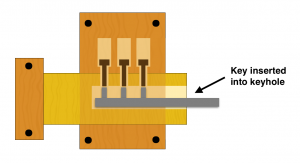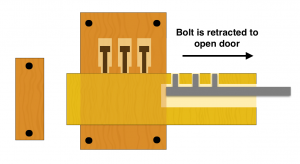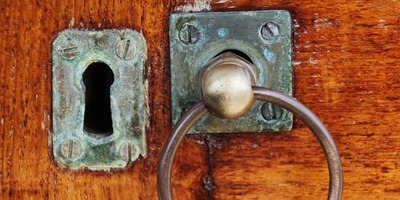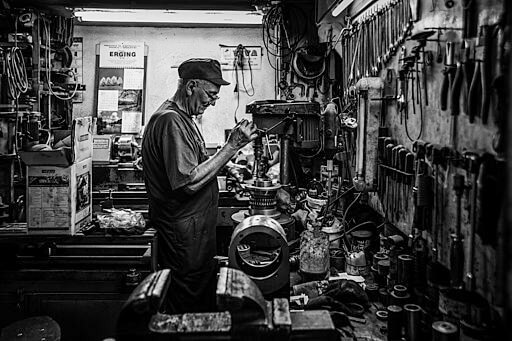Nothing more fitting than a brief history lesson to kick off our brand new website with. I actually knew nothing about the origins of locksmithing, so was happy to write this post and learn some history.
Definition of a Locksmith: Someone who works on locks, keys, security systems is known as a locksmith.
It is believed Ancient Egypt and Babylon are the sources for the locksmithing trade and started some 4000 years ago. Ancient Egypt seems to get the credit for the origins of a lot of things and I guess being one of the oldest civilisations that makes sense.
Locks in the ancient worlds were large and wooden, and surprisingly worked in a similar way as they do today, i.e. with pins that are manipulated by a key. Although not as versatile as todays locks, these ancients locks were used to lock doors and were operated by a large wooden key.
Egyptian Lock Mechanism

(Image Attribution: By Willh26 – Own work, CC BY-SA 4.0, Link)

(Image Attribution: By Willh26 – Own work, CC BY-SA 4.0, Link)
Locksmith technology began to spread through out the world to ancient Greece and Rome, and also to the east including China. It is thought that the ancient Romans, the wealthy ones, would wear the keys to their locks on their fingers and was a measure of status and wealth. I guess the same one would flash around the keys to a Lamborghini today.
Skipping ahead to 18th century Europe, the development of more complex locking designs was a result of the advances in metallurgy around these times. Following on, the industrial revolution then allowed for mass produced locks which were inexpensive and used worldwide. This resulted in locks being replaced rather than repaired as was the tradition.
In 1778, a patent to a double acting tumbler lock was applied by Robert Barron. This seems to be the first real improvement to lock security. The tumbler lock patented by Robert Barron was an evolution of the original lock mechanism created by the ancient Egyptians and this type of lock is still around today.
In 1818, a man with a surname that most of us recognise, Jeremiah Chubb, was responsible for creating the “Chubb Detector Lock” which could only be opened with its own key and also incorporated a feature that would indicate if the lock had been tampered with. For his efforts, Chubb received £100 from the British Government for the design of a lock that a lock picker could not pick after 3 months.
The world renowned security company known as Chubb that is still in operation today, was later formed in 1820 by Jeremiah and his brother Charles.
Due to the mass production of inexpensive locks, most locksmiths found themselves specialising in other areas such as high security safes and strongboxes, door hardware and in modern times electronic security systems. Another important part of being a locksmith is the fitting and replacement of keys, and the installation of high end locks.
The locksmith industry is one of the older industries in modern civilisation, and has to adapt over the centuries to current technologies, and keep up with outwitting burglars. Perhaps the industry hasn’t been recognised enough over the times, after all without locks and security, where would all of our possessions be?
(Main Image Attribution: By Maja Stosic [CC BY-SA 3.0 rs], from Wikimedia Commons)

